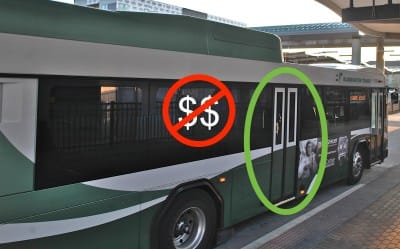COVID-19 means fare-free Bloomington buses for now, rear-door entry preferred


Over the weekend, Bloomington’s public bus agency, announced that its downtown transit center’s indoor waiting area would be closed starting Monday (today), because of concerns about transmission of the COVID-19 pandemic virus.
The downtown transit center’s closure eliminated one option that passengers had for paying the $1 fare for Bloomington Transit buses—sales of bus tokens at the customer service desk inside the center.
Now, the task of buying fare media for public buses in Bloomington has been eliminated, at least for the time being.
Bloomington transit issued a press release on Monday announcing that fares would be eliminated on fixed route and BT Access buses “until further notice.” BT Access is the bus agency’s para-transit service.
Bloomington Transit is also asking passengers on its regular fixed route buses to board through the rear door. There’s now no need for the driver to monitor fares, so the rear door is an option.
The reason for preferring the rear door is to create more distance between drivers and passengers, in an effort to help prevent the spread of COVID-19. Passengers who use wheelchairs to get around, can still board through the front door, where the ramps are located.
BT’s general manager, Lew May, told The Square Beacon that the fare-free strategy and rear door boarding was suggested to the drivers’ union (AFSCME) by BT management. The union is supportive, according to May.
Closure of the indoor waiting area means that the public restrooms located there are no longer accessible. Bloomington Transit is also adding portable toilets at the downtown transit center starting Tuesday, March 24.
The idea of providing some kind of “fare-free” option for public transit in Bloomington has been part of recent community discussions about ways to enhance public bus service and fight climate change.
In that context, some proposals have included a reimbursement to BT of Bloomington resident fares, which would make it possible for rank-and-file citizens to board BT buses similar to the way that Indiana University affiliates or city of Bloomington employees board them. They show the driver an ID establishing their affiliation.
About the missing fare revenue during the COVID-19 pandemic, May told The Square Beacon, that fare revenue was expected to be greatly reduced, anyway. An earlier press release from BT indicated that ridership during the university’s spring break last week was down 33 percent compared to the week of spring break last year.
May said in light of Indiana governor Eric Holcomb’s “stay-at-home” order issued earlier on Monday, ridership is expected further decrease even more.
May said the U.S. Senate is considering legislation with proposed funding to help transit systems across the country—to make up for lost revenue and added expenses.
Some of those expenses include the nightly disinfection of the buses using special equipment.




Comments ()